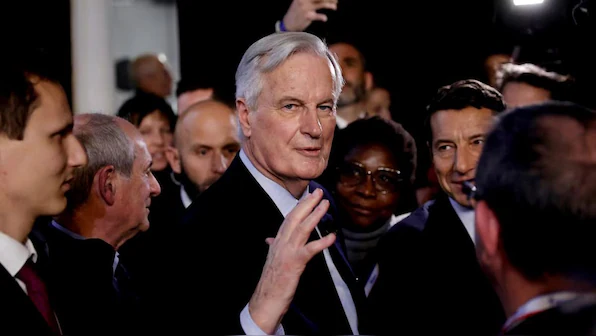The French government is facing a no-confidence vote after Prime Minister Michel Barnier pushed through budget measures without parliamentary approval.
The National Assembly is due to vote today, Wednesday, December 4, 2024, after debating two motions introduced by the left-wing camp and far-right nationalists, which together count more than 330 politicians.
A no-confidence motion requires at least 288 of 574 votes to pass.
The far-right National Rally (RN) of three-time presidential candidate, Marine Le Pen is expected to vote for the motion put forward by the left, giving it enough numbers to pass.
The session is due to start at 4pm (15:00 GMT), with voting expected hours later. President Emmanuel Macron is set to return to France from a state visit to Saudi Arabia during the day.
If the measure passes, as is expected, it would mark the first time a French government has been removed this way in more than 60 years, since a defeat for Georges Pompidou’s government in 1962, when Charles de Gaulle was President.
Macron, whose term ends in 2027, has dismissed the threat of his potential removal from office amid the turmoil, saying such discussions were “make-believe politics.”
Macron was quoted as saying by French media, “I’m here because I’ve been elected twice by the French people.” He added, “We must not scare people with such things. We have a strong economy.”
However, the toppling of the Barnier government after just three months in office would leave the President with few options over how to go forward and who to appoint in his place.
No new elections can be called for a year after the previous legislative polls. Macron could ask Barnier to stay on in a caretaker role as he seeks a new Prime Minister, which could happen only next year.
Barnier Sees Chance Of His Government’s Survival

Asked on French television if there was a chance his government could survive Wednesday’s vote, Barnier replied, “I want this and it is possible.”
“It depends on the MPs. Each of whom has a responsibility to the French people, to the voters in his or her constituency, and also to France, which is going through a rather serious period.
“I think that there will be this reflex of responsibility where, beyond the political differences, the divergences, the contradictions that are normal in a democracy, we say to ourselves that there is a higher interest.”
Michel Barnier
Barnier also argued that he had not been “given the runaround” by Le Pen during negotiations over the social security budget.
The French Prime Minister had tried to appease the National Rally (RN) at the last minute by making concessions such as scrapping electricity price hikes, but it was not enough to prevent Le Pen’s party and a leftwing alliance tabling no-confidence motions.
The latest political turmoil follows snap elections called by Macron in June in a bid to halt the surge of the far right, which left no party or faction in parliament with a majority.
Some observers have suggested that Le Pen, 56, is seeking to bring down Macron before his term ends by ousting Barnier.
The far-right leader is embroiled in a high-profile embezzlement trial and, if found guilty in March, could be blocked from participating in France’s next presidential election in 2027.
She has insisted that the party’s stance was entirely due to a budget that would make the French poorer.
The no-confidence vote will be closely watched across the eurozone, where there is already considerable concern over Germany’s political crisis and upcoming elections in February, and the return of US President-elect Donald Trump to the White House next month.
READ ALSO: Greater Accra Win Not Reflective of National Victory

















